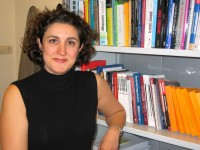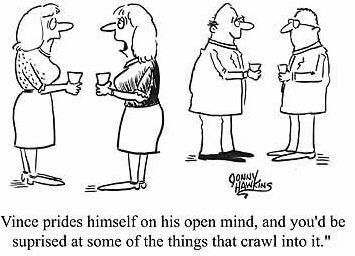11/05/2006
Too thick or too thin?
 There was a newspaper article from some weeks ago that I still wanted to write about. It is called: “Hey Dutchman, step aside with your thick identity”, an article based on an oration of Halleh Gorashi (originally from Iran), the newly appointed professor for Management of Diversity and Integration, at the Vrije Universiteit in Amsterdam.
There was a newspaper article from some weeks ago that I still wanted to write about. It is called: “Hey Dutchman, step aside with your thick identity”, an article based on an oration of Halleh Gorashi (originally from Iran), the newly appointed professor for Management of Diversity and Integration, at the Vrije Universiteit in Amsterdam.The article was very interesting, and I agree with most of what she says. Only at the point of the thick identity I don’t agree. Below is a summary of the article.
Ghorashi says that the seventies in the Netherlands were characterized by integration while keeping ones original identity. Nowadays this soft approach is supposed to be replaced by a totally different approach: to force immigrants to assimilate is considered as stimulating integration. But according to Gorashi there has been no fundamental shift in the thoughts about diversity. At present, just like in the seventies, a common perception is that the cultural background of immigrants is totally different from natives. This is related to the past structure of the Dutch society with the different cultural and religious pillars; it seems to be impossible in the Netherlands to see an individual immigrant without taking into consideration the ethnic and cultural categories that the person belongs to.
So is there something that did really change, if it is not the way we think about and deal with diversity? A fundamental change is that we should be allowed now to “say the things as they are”. The philosopher Baukje Prins calls this “new realism”. The new realist is someone with guts, who dares to speak out, who protests against outdated political correctness. This new attitude would never have gained so much support in the Netherlands if it would not have been a common idea since years that immigrants differ from what is considered as “normal”, both culturally, socially and economically. If this doesn’t change, the emphasis on differences between immigrants and the Dutch will continue to feed the polarization between “us” and “them”.
So what should we do to be able to deal with cultural differences?
- In the first place it is important to break through the thinking in cultural contrasts. It is impossible to stop thinking in categories completely. But to think in absolute categories is too simple, individuals always exceed these categories.
- A true democratic pluriformal attitude means that you have to accept the otherness of the other, that you allow the other to be different.
- For a new multicultural Holland it is necessary to make room for others, to be able to step aside. People should be willing to meet “the other” with open arms. Only when we accept the strangers among us, only then can they choose to become full Dutch citizens. Transculturals (Ghorashi calls them cultural hybrids) are not a threat to the Dutch society, on the contrary, they are an enrichment. They symbolize an important value for our modern society: freedom. They choose the best out of different cultures, they are not restricted by what is taken for granted in their original culture.
- For good intercultural contact, intercultural competences are needed, like an attitude of open-mindedness and curiosity. Moreover people have to try to postpone their personal judgments. It is necessary to put aside your own coloured glasses as much as possible, because if you don’t do this, you listen more to your own thoughts than to what the other person is actually saying.
 Gorashi continues to say that we should not automatically assume that immigrants are more strongly related to their original culture than to the new culture. It is very well possible that the imprint from the new culture is the same or bigger. We are not determined by our roots, we can decide to change and adapt to a new culture. And it is not necessary to first give up the old culture before a new culture could be adopted, it is most of the time very well possible to combine the two.
Gorashi continues to say that we should not automatically assume that immigrants are more strongly related to their original culture than to the new culture. It is very well possible that the imprint from the new culture is the same or bigger. We are not determined by our roots, we can decide to change and adapt to a new culture. And it is not necessary to first give up the old culture before a new culture could be adopted, it is most of the time very well possible to combine the two.
The summary of Gorashi's article ends here, and now we are coming to the point where I disagree with Gorashi. She says that other cultures are excluded from the Dutch identity because the Dutch culture is too thick. According to Gorashi, there is an implicit but very strong notion of who is a “real” Dutchman and who not. A typical Dutchman is white and with a Jewish/Christian background, says Gorashi. But being white doesn’t have much to do with an outlook on life, identity, standards and values. And what does it mean to have a Jewish/Christian background? Which Dutch person really knows something about Judaism? What do we celebrate exactly with Easter and the even more vague Christian holidays? The churches become more and more empty, you only see people with gray hair there. If there is one country with atheism / secularism as the dominant culture than it is the Netherlands. I think the Dutch identity is not too thick, but too thin. We don’t really know who we are. We are supposed to be a tolerant people, but is that really true at present?
Today I saw a survey in the newspaper called “21 minutes”, in which 170.000 respondents were asked how they think about the main issues in our society at present. It turned out that there is a huge discrepancy between the values that people find important, and what they find back of these values in practice in the society. In the desired society solidarity, quality of life, modesty, respect for authority and social security are considered to be very important values by the majority of the population. But what do we find in the current Dutch society? A lot of individualism, focus on material success, brutality, rudeness, lack of social security / own responsibility. We would like to have more of a community spirit, to show solidarity, to be tolerant, to be polite to each other, to show respect. But in practice we don’t do that much. Why not? I think that the process of individualization took place without choosing deliberately for it, even without noticing it, in a similar way as the fast process of secularization took place. And because of that, the requests for more decency, better manners, and more standards and values – as the prime minister asks for that – have become empty words. What does it mean to have a Jewish / Christian background? How do we express that identity in our daily lives? I think almost nobody can answer that question. And maybe it is because our identity is so thin, that we are afraid when the number of Muslims is growing in the Netherlands, if our identity is so thin and theirs so thick, we can easily be pushed in a corner. While, on the other hand, if we would not feel so insecure about our own identity, we would not be afraid of loosing what we have, and then we could receive strangers with open arms and create a new thick inclusive Dutch transcultural identity…
And abraham was born looooong before muhammad was even a dirty thought in his unknown parents mind and swimming like a tadpole in his fathers balls so that claim is hilarious, if not sad.
What if for ex Donald Duck(pbuh) claims that mohd was the first Donaldist and then make a cartoon his followers then believe is the true revelation to prove that Donald Duck(pbuh) was indeed righteous?
You can see here how some Orkuters talk about the Quran and Prophet Mohammed (and the "jokes" that are made with Donald Duck with a long black beard) ...
This has got nothing to do with my weblog (certainly not with the post above) but there are some reasons why this is posted here and not in Orkut...
The increase in left votes these elections is hopeful though: shows that solidarity and sharing is indeed still an issue for many people.
Good pieces, hope you have a constructive-yet-fun time in Nicaragua.
And Nicaragua was indeed both constructive and fun :)
<< Home

